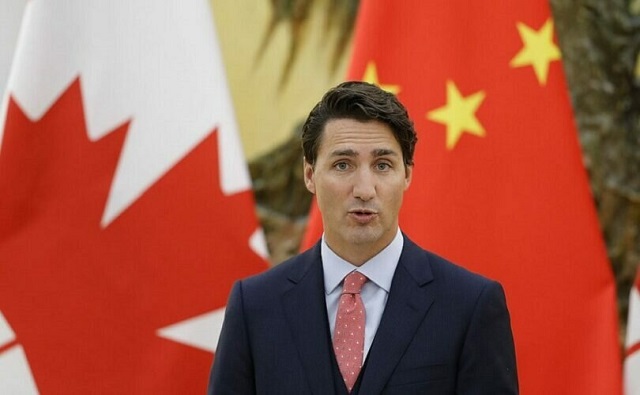Opinion
UPDATED: SNC Lavalin – Just the Facts Ma’am

Opinion by Cory Litzenberger
Let’s take emotion out of it. Let’s take a look at the legislation. While I am not a lawyer, I do interpret tax legislation for a living, and so I decided to take a closer look at the criminal legislation pertaining to the SNC-Lavalin scandal.
The relevant legislation is in 《parentheses》below, but here is the Coles notes:
FACT – in 2015 SNC was charged by the RCMP under Section 3 of the Corruption of Foreign Public Officials Act
《3 (1) Every person commits an offence who, in order to obtain or retain an advantage in the course of business, directly or indirectly gives, offers or agrees to give or offer a loan, reward, advantage or benefit of any kind to a foreign public official or to any person for the benefit of a foreign public official
(a) as consideration for an act or omission by the official in connection with the performance of the official’s duties or functions; or
(b) to induce the official to use his or her position to influence any acts or decisions of the foreign state or public international organization for which the official performs duties or functions.》
FACT – In 2015, the RCMP charged SNC-Lavalin, along with its international division, with corruption and fraud in relation with their business dealings in Libya. The RCMP said officials at the company attempted to bribe several public officials in the country, including dictator Moammar Gadhafi, as well as other businesses in Libya.
FACT – The prosecutor is allowed to enter into a remediation agreement under Section 715.32 of the Criminal Code of Canada , if ALL conditions are met under 715.32(1).
《715.32 (1) The prosecutor may enter into negotiations for a remediation agreement with an organization alleged to have committed an offence if the following conditions are met:
(a) the prosecutor is of the opinion that there is a reasonable prospect of conviction with respect to the offence;
(b) the prosecutor is of the opinion that the act or omission that forms the basis of the offence did not cause and was not likely to have caused serious bodily harm or death, or injury to national defence or national security, and was not committed for the benefit of, at the direction of, or in association with, a criminal organization or terrorist group;
(c) the prosecutor is of the opinion that negotiating the agreement is in the public interest and appropriate in the circumstances; and
(d) the Attorney General has consented to the negotiation of the agreement.》
FACT – for the prosecutor to evaluate their public interest opinion, they must consider subsection 715.32(2) in its entirety which includes many relevant pieces of information except when 715.32(3) overrides it
《 Factors to consider
715.32(2) For the purposes of paragraph (1)(c), the prosecutor must consider the following factors:
[(a) to (h)]; and
(i) any other factor that the prosecutor considers relevant.》
FACT – 715.32(3) says even with all those factors to consider, you can NOT factor in the national economic interest (ie: the jobs argument) if they were charged the way the RCMP charged them
《Factors not to consider
715.32(3) Despite paragraph (2)(i), if the organization is alleged to have committed an offence under section 3 or 4 of the Corruption of Foreign Public Officials Act, the prosecutor must not consider the national economic interest, the potential effect on relations with a state other than Canada or the identity of the organization or individual involved.》
CONCLUSION – the jobs argument is irrelevant under the law in these circumstances – The prosecution knows this – The former Attorney General knows this – and based on the provisions as written, the jobs argument for SNC does not meet the legal requirement for a remediation agreement.
For these reasons, I find in favour of the former Attorney General.
— — — —
Update: While being interviewed on the afternoon of March 7, 2019, I looked even closer at the legislation and caught something I didn’t realize on first glance when reading it.
Notice at the end of 715.32(1)(c) the word “and”.
While I said this means that all of the tests in (a) through (d) must be met, I neglected to say that this means no one person has the sole final decision. The prosecutor is mentioned in (a), (b), and (c); while the Attorney General is only mentioned in (d).
To put another way, this law is written so that it is not solely the decision of the Attorney General, nor the prosecutor. Rather, it requires both the Attorney General and the Prosecutor to agree to proceed with negotiations.
Similar to a scene in the movies where you see nuclear codes kept between two different military heads before proceeding with the launch, such is the wording of this provision.
This means that the Attorney General does not have the final decision and so any suggestion that she does is incorrect. The decision is a joint one with most of the leg work having to be done by the prosecutor, not the Attorney General.
So let me recap: I think it is quite simple, that a Remediation Agreement (aka Deferred Prosecution Agreement) cannot be considered under the “national economic interest” (jobs) argument based on what legislation the RCMP used for the charges.
If that’s the argument, then the answer is “no” and the repeated number of times asking for the former Attorney General to revisit it over a four month period for something that appears so black and white might be considered workplace harassment if I were to do such a thing to one of my colleagues.
So, since the economic argument is moot, what other argument is there?
We heard in testimony that the parties may have wanted the Attorney General to look at it from a stance that does not imply economic interest.
Ironically, “we need to win an election” may actually be legal as “any other factor that the prosecutor considers relevant” but then we would have to assume the prosecutor would have to be partisan, and that is highly not likely in my experience.
So we now know that there must be an agreement between the prosecutor and the Attorney General.
We also know that “economic interest” cannot be the reason under the law.
So, if the law is that clear on economic interest, why would the Attorney General be asked repeatedly for reconsideration, unless it was not “economic interest” they wanted her to consider?
For these additional reasons, I still find in favour of the former Attorney General
—
Update #2: On March 8, 2019, the Federal Court of Canada ruled in favour of the Public Prosecution Service on SNC Lavalin’s request for judicial review citing:
“The law is clear that prosecutorial discretion is not subject to judicial review, except for abuse of process.” – Federal Court of Canada Justice Kane
Then, on March 11, 2019, the Organisation for Economic Co-operation and Development (OECD) came to the same conclusion as my interpretation of the law regarding the intention of the 1999 agreement, and said:
“political factors such as a country’s national economic interest and the identity of the alleged perpetrators must not influence foreign bribery investigations and prosecutions.” – OECD
We now have confirmation that there is no legal way that a country’s national economic interest can be considered under the law.
For these additional reasons, jurisprudence about the authority of the Public Prosecution Service, and third party reports about the intentions of the 1999 agreement from the OECD, I still find in favour of the former Attorney General for a third time.
—
Cory G. Litzenberger, CPA, CMA, CFP, C.Mgr is the President & Founder of CGL Strategic Business & Tax Advisors; you can find out more about Cory’s biography at http://www.CGLtax.ca/Litzenberger-Cory.html
National
Canada’s Governor General slammed for hosting partisan event promoting Trudeau’s ‘hate speech’ bill

From LifeSiteNews
Mary Simon, Canada’s supposed non-partisan head of state, appeared to be supporting a Liberal government bill that will further regulate the internet.
Governor General Mary Simon, who serves as Canada’s official non-partisan head of state and representative of King Charles III, has taken heat for hosting a conference supporting a new federal government bill that could lead to large fines or jail time for vaguely defined online “hate speech” infractions.
On April 11, Simon hosted an event titled “The Governor General’s Symposium: Building a Safe and Respectful Digital World” at her Rideau Hall residence, with the goal to “bring together individuals who experience online violence and experts from across the country to share their experiences, explore solutions, and create allyship and networks of resilience.”
The guest list for those invited included those supportive of Liberal Minster Attorney General Arif Virani’s Bill C-63, or Online Harms Act. Some of the invited guests included former Global News reporter Rachel Gilmore, LGBTQ activist Fae Johnstone, Chief Public Health Officer Dr. Theresa Tam, and Ottawa school trustee Nili Kaplan-Myrth. No members of the Conservative Party or independent journalists were invited.
After news spread of the event, which Simon herself posted about on X, many took to social media to voice concerns over Simon hosting the event.
“Can you imagine the Queen having a seminar at Buckingham Palace to talk about a bill before the House of Commons in England? That would be outrageous. That’s what @GGCanada Mary Simon just did,” said political commentator Tom Korski on a CBC radio show.
Another X user @IMHeatherAmI wrote, “Trudeau has corrupted everything.GG Mary Simon is abusing her power by “promoting contentious Liberal bills that are trying to be passed in Parliament.”
Rideau Hall gave no comment that Canada’s supposed non-partisan head of state appeared to be supporting a Liberal government bill that will further regulate the internet.
“The Governor General is non-partisan and apolitical,” Rideau Hall said in a statement.
In comments sent to the media about apparent conflicts of interest, a spokesperson for Simon said that she will keep advocating for “digital respect.”
Conservative Party spokesman Sebastian Skamski observed that Simon should be “ashamed” for “politicizing and exploiting” the office of Governor General, which is supposed to be completely non-partisan.
The Online Harms Act was introduced in the House of Commons on February 26 by Virani and was immediately blasted by constitutional experts as troublesome.
Bill C-63 will modify existing laws, amending the Criminal Code as well as the Canadian Human Rights Act, in what the Liberals claim will target certain cases of internet content removal, notably those involving child sexual abuse and pornography.
However, the bill also seeks to police “hate” speech online with broad definitions, severe penalties, and dubious tactics.
Details of the new legislation to regulate the internet show the bill could lead to more people jailed for life for “hate crimes” or fined $50,000 and jailed for posts that the government defines as “hate speech” based on gender, race, or other categories.
The bill also calls for the creation of a digital safety commission, a digital safety ombudsperson, and a digital safety office.
The Justice Centre for Constitutional Freedoms (JCCF) has said Bill C-63 is “the most serious threat to free expression in Canada in generations. This terrible federal legislation, Bill C -63, would empower the Canadian Human Rights Commission to prosecute Canadians over non-criminal hate speech.”
JCCF president John Carpay recently hand-delivered a petition with 55,000-plus signatures to Canada’s Minister of Justice and all MPs.
Agriculture
Bill C-282, now in the Senate, risks holding back other economic sectors and further burdening consumers

From the Frontier Centre for Public Policy
Bill C-282 currently sits in the Canadian Senate and stands on the precipice of becoming law in a matter of weeks. Essentially, this bill seeks to bestow immunity upon supply management from any potential future trade negotiations without offering increased market access to potential trade partners.
In simpler terms, it risks holding all other economic sectors hostage solely to safeguard the interests of a small, privileged group of farmers. This is far from an optimal scenario, and the implications of this bill spell bad news for Canadians.
Supply management, which governs poultry, egg, and dairy production in Canada, has traditionally enabled us to fulfill our domestic needs. Under this system, farmers are allocated government-sanctioned quotas to produce food for the nation. At the same time, high tariffs are imposed on imports of items such as chicken, butter, yogurt, cheese, milk, and eggs. This model has been in place for over five decades, ostensibly to shield family farms from economic volatility.
However, despite the implementation of supply management, Canada has witnessed a comparable decline in the number of farms as the United States, where a national supply management scheme does not exist. Supply management has failed to preserve much of anything beyond enriching select agricultural sectors.
For instance, dairy farmers now possess quotas valued at over $25 billion while concurrently burdening dairy processors with the highest-priced industrial milk in the Western world. Recent data indicates a significant surge in prices at the grocery store, with yogurt prices alone soaring by over 30 percent since December 2023. This escalation is increasingly straining the budgets of many consumers.
It’s evident to those knowledgeable about the situation that the emergence of Bill C-282 should come as no surprise. Proponents of supply management exert considerable influence over politicians across party lines, compelling them to support this bill to safeguard the interests of less than one percent of our economy, much to the ignorance of most Canadians. In the last federal budget, the dairy industry alone received over $300 million in research funds, funds that arguably exceed their actual needs.
While Canada’s agricultural sector accounts for approximately seven percent of our GDP, supply-managed industries represent only a small fraction of that figure. Supply-managed farms represent about five percent of all farms in Canada. Forging trade agreements with key partners such as India, China, and the United Kingdom is imperative not only for sectors like automotive, pharmaceuticals, and biotechnology but for the vast majority of farms in livestock and grains to thrive and contribute to global welfare and prosperity. It is essential to recognize that Canada has much more to offer than merely self-sufficiency in food production.
Over time, the marketing boards overseeing quotas for farmers have amassed significant power and have proven themselves politically aggressive. They vehemently oppose any challenges to the existing system, targeting politicians, academics, and groups advocating for reform or abolition. Despite occasional resistance from MPs and Senators, no major political party has dared to question the disproportionate protection afforded to one sector over others. Strengthening our supply-managed sectors necessitates embracing competition, which can only serve to enhance their resilience and competitiveness.
A recent example of the consequences of protectionism is the United Kingdom’s decision to walk away from trade negotiations with Canada due to disagreements over access to our dairy market. Not only do many Canadians appreciate the quality of British cheese, but increased competition in the dairy section would also help drive prices down, a welcome relief given current economic challenges.
In the past decade, Canada has ratified trade agreements such as CUSMA, CETA, and CPTPP, all of which entailed breaches in our supply management regime. Despite initial concerns from farmers, particularly regarding the impact on poultry, eggs, and dairy, these sectors have fared well. A dairy farm in Ontario recently sold for a staggering $21.5 million in Oxford County. Claims of losses resulting from increased market access are often unfounded, as farmer boards simply adjust quotas when producers exit the industry.
In essence, Bill C-282 represents a misguided initiative driven by farmer boards capitalizing on the ignorance of urban residents and politicians regarding rural realities. Embracing further protectionism will not only harm consumers yearning for more competition at the grocery store but also impede the growth opportunities of various agricultural sectors striving to compete globally and stifle the expansion prospects of non-agricultural sectors seeking increased market access.
Dr. Sylvain Charlebois is senior director of the agri-food analytics lab and a professor in food distribution and policy at Dalhousie University.
-

 Alberta2 days ago
Alberta2 days agoFree Alberta Strategy backing Smith’s Provincial Priorities Act
-

 Business2 days ago
Business2 days agoUS firms like BlackRock are dropping their climate obsession while Europe ramps theirs up
-

 Automotive2 days ago
Automotive2 days agoBiden’s Kill Switch: The Growing Threat of Government Control of Your Car
-

 COVID-191 day ago
COVID-191 day agoPro-freedom Canadian nurse gets two years probation for protesting COVID restrictions
-

 espionage1 day ago
espionage1 day agoTrudeau’s office was warned that Chinese agents posed ‘existential threat’ to Canada: secret memo
-

 Economy1 day ago
Economy1 day agoMassive deficits send debt interest charges soaring
-

 International2 days ago
International2 days ago28-year-old Dutch woman to be killed by assisted suicide after doctors deem her autism ‘untreatable’
-

 International21 hours ago
International21 hours agoBrussels NatCon conference will continue freely after court overturns police barricade







